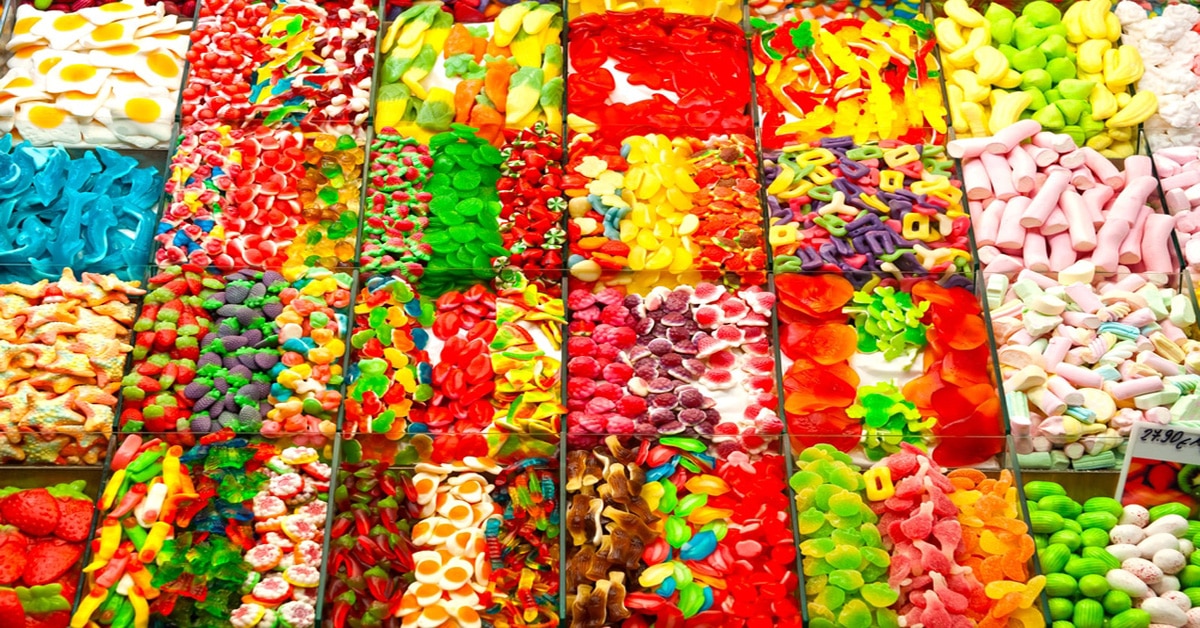Spanish Candy – Spain’s Sweet Side
Spain is known not only for its amazing sweets and famous Spanish candy, but also for its rich cuisine, festivals, and culture that celebrate life itself. We are all familiar with Spanish gastronomy and its unique dishes that are famous worldwide. In this article, we’ll dive into the sweet history and adventure of Spanish candy. We’ll discuss a brief history of Spanish candy and review the most popular sweets and chocolates in this country. In the end, you can also discover the most famous candy brands in Spain.
Spanish Candy Names
- Huesitos
- Conguitos
- Simon Coll Chocolate 99% Cocoa
- Turrón
- Marzipan
- Mantecado
- Chupa Chups
- Lacasitos
- Kinder Bueno
- Pikotas
- Fresquito
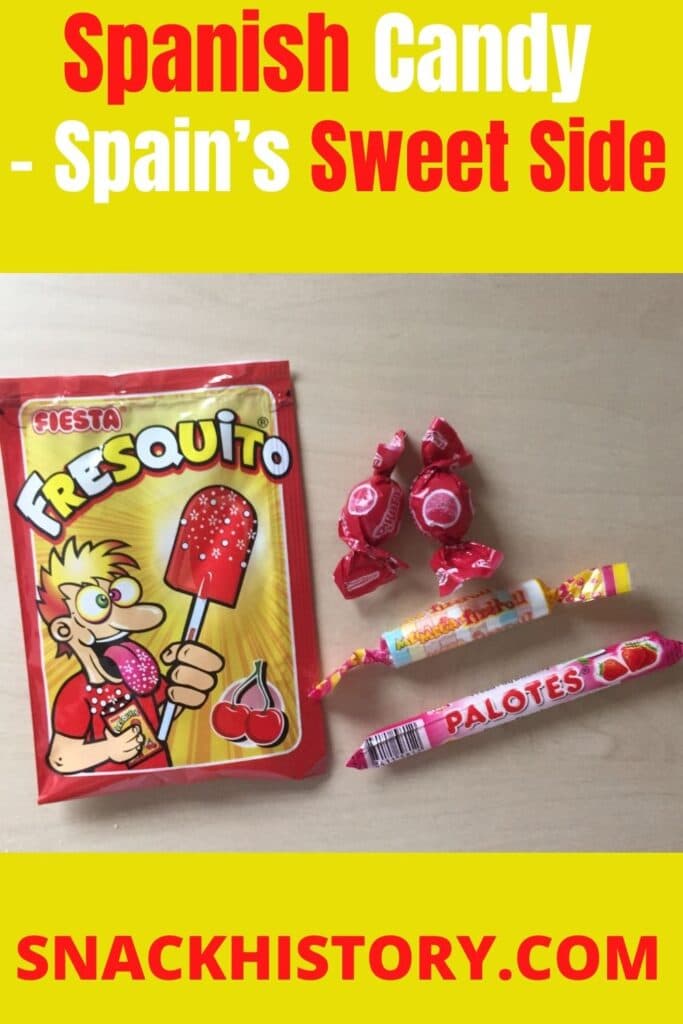
Top Spanish Candy – Most Popular Chocolates
Chocolate has a very special place in the Spanish candy industry. Here, the pure taste of cocoa itself is the most important thing. The products offered by brands such as Simon Cole, Valor, Lacasa, and Chocolate Matias Lopez are concentrated to be of the highest quality chocolate. Starting from the form of tablets, it ends with drinking chocolates. Let’s take a look at the most popular chocolates in Spain.
Please leave a review or any memories of this snack in the comments at the bottom of this page. Thank you!
1. Huesitos
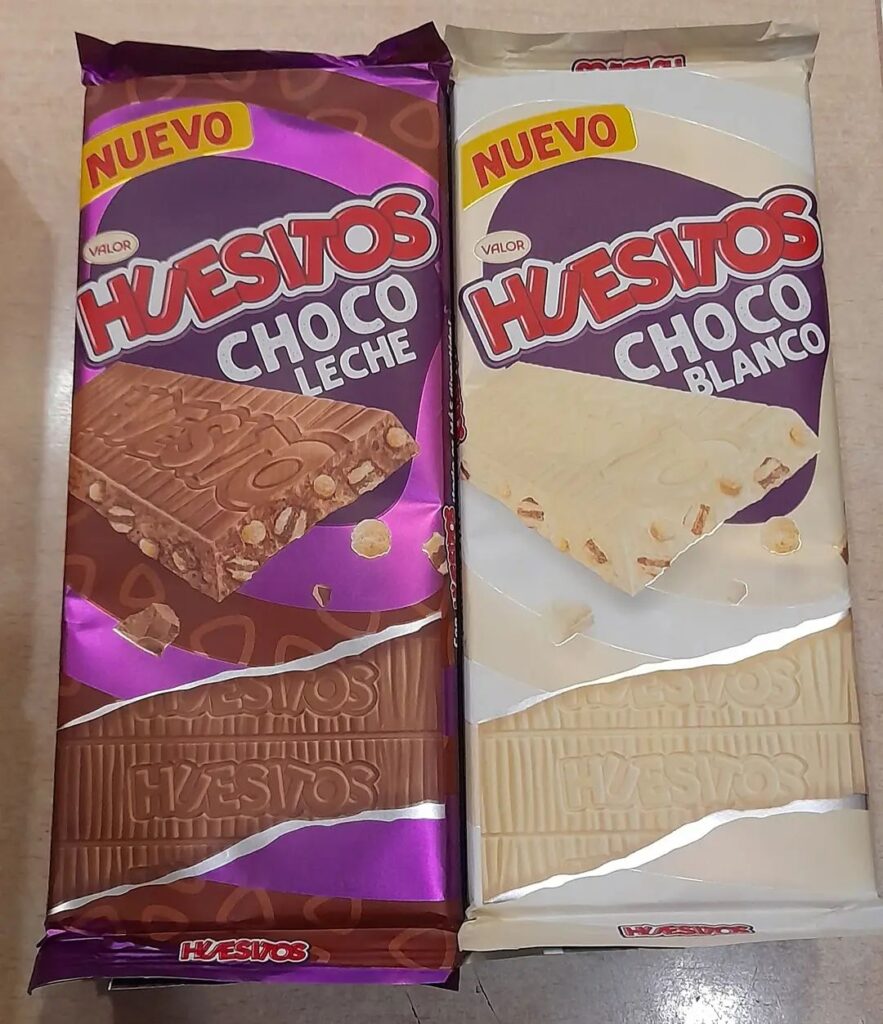
Huesitos is a Spanish candy bar, created in 1975 by the candy manufacturer brand Chocolates Valor. Since then, the bar has been very popular with people. There are four different types of this Spanish candy. There is hazelnut in some variations.
The original one, which is made from a wafer and is covered with milk and chocolate. The second variation of this candy is “Super Chock.” They are almost the same, but here the amount of chocolate is greater. Some of the other variations include White Chocolate Huesitos and Creamy Huesitos.
2. Conguitos
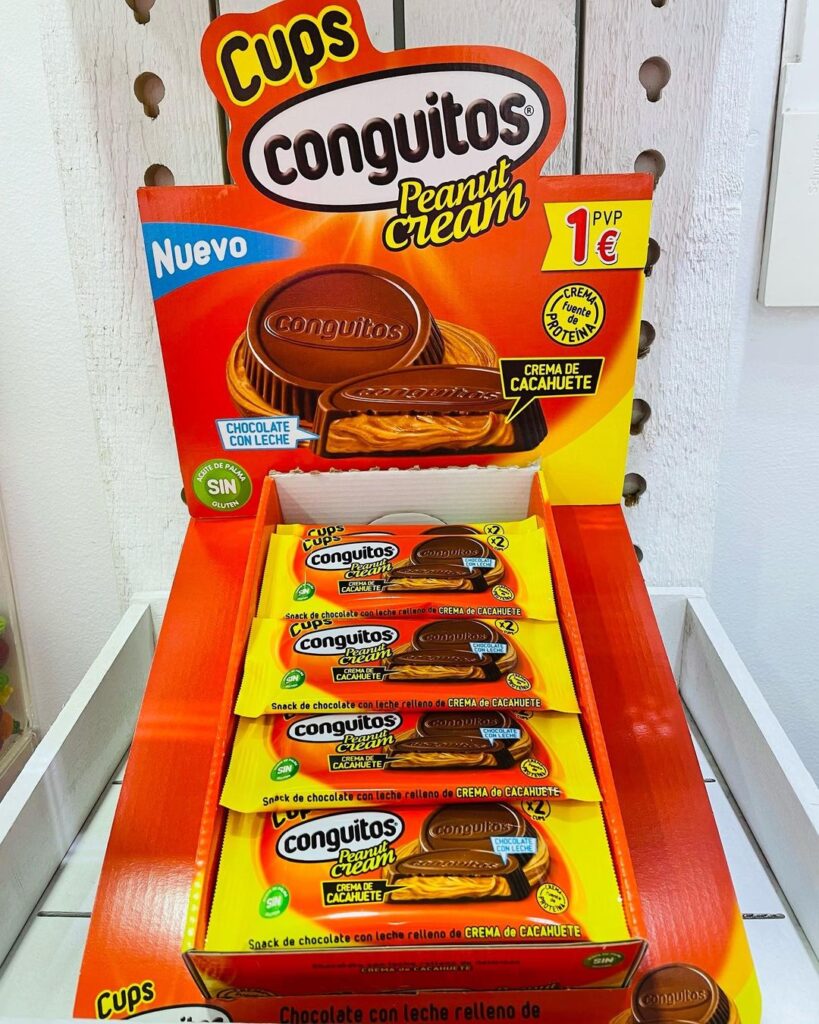
Conguitos is a classic Spanish candy made by Lacasa. There are several variations of this particular chocolate candy. However, the original is made of regular chocolate. Besides, some of the other popular variations include White chocolate Conguitos, Milk Chocolate Conguitos, and mini Conquitos. We can also find a package containing a mix of all the kinds of chocolates offered by the brand.
On the package, there is a little animated figure. The figures are black on black chocolate Conguitos and white on white chocolate ones. Surprisingly, many people blamed Conguitos for contributing to racism.
3. Simon Coll Chocolate 99% Cocoa
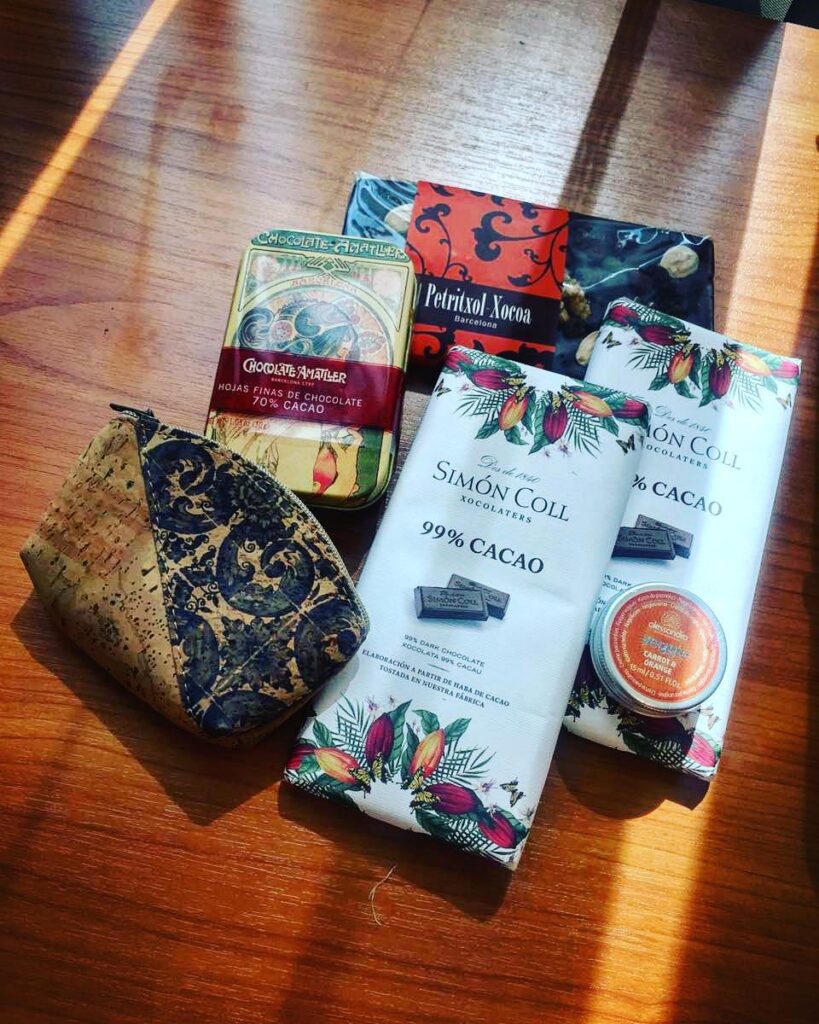
Chocolate is manufactured by the brand Simon Coll. It is made with pure natural ingredients and is rated as a high-quality product.
It contains very little sugar and a higher percentage of cocoa. So, the intensity and taste of cocoa are ideally strong. It has some creaminess alongside the bitter taste of chocolate. Most importantly, this Spanish candy does not have artificial additions and is gluten-free.
The packaging is rather unique. This particular chocolate, and other ones provided by the Simon Coll brand, have beautiful vintage looks.
Masterpieces of Spanish Confectionery
For centuries, Spanish people had special treats that they enjoyed on special occasions. And it was passed down the generations. The most typical and famous Spanish candy generally includes Turron and Marzipan.
4. Turrón
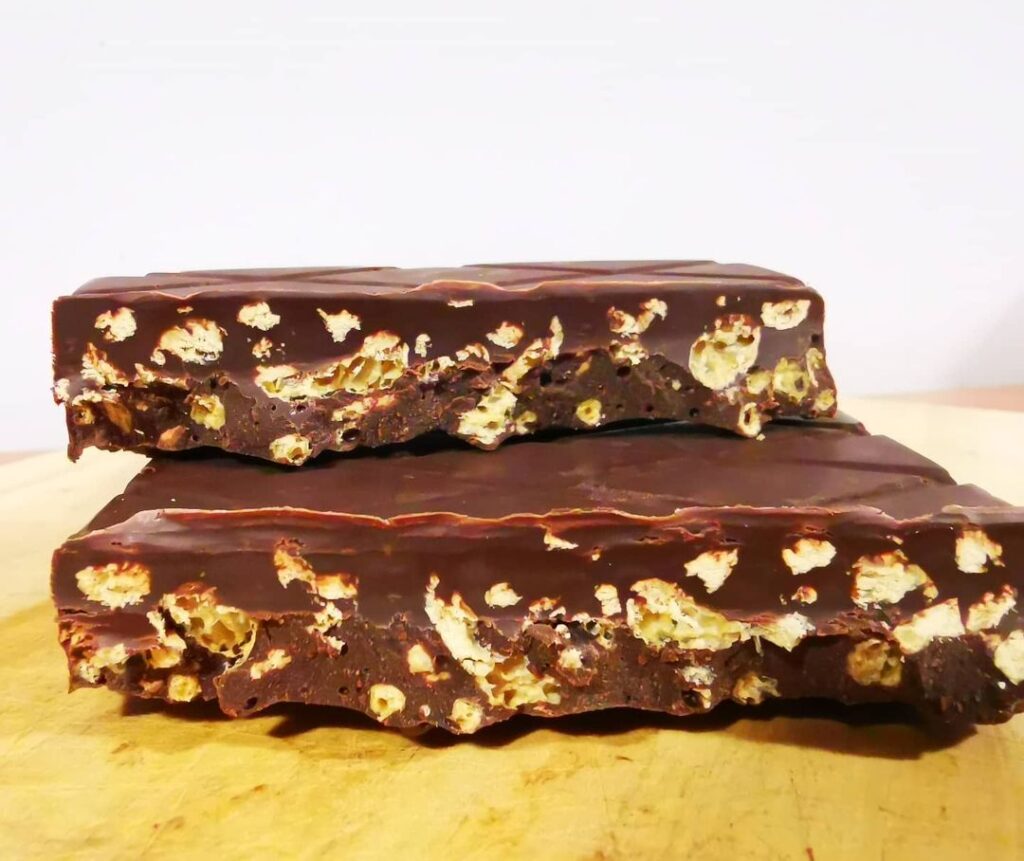
When talking about Spanish candy and sweets, it is impossible not to start with Turron. It consists of sugar, almonds, hazelnuts, walnuts, honey, and pistachios. Spanish candy is hugely influenced by Arabic culture, which is more than 500 years old.
The birthplace of this famous Spanish candy is Jijona in Alicante. It is the place where, in the 8th century, almond trees were planted by Arabs. The place is a PGI (Protected Geographical Indication). There are two different kinds of turron: Jijona and Alicante. The difference between these two is that in Jijona, almonds are whole and in Alicante, they are crushed.
Turron is golden in color and has a crunchy texture. Today, the original Turron is produced in the province of Lleida. Candy bars come in a disc and rectangular forms. Other than the traditional varieties, different ones came alongside too. New ingredients have been added, such as truffles, chocolate, liqueurs, and egg yolks.
5. Marzipan
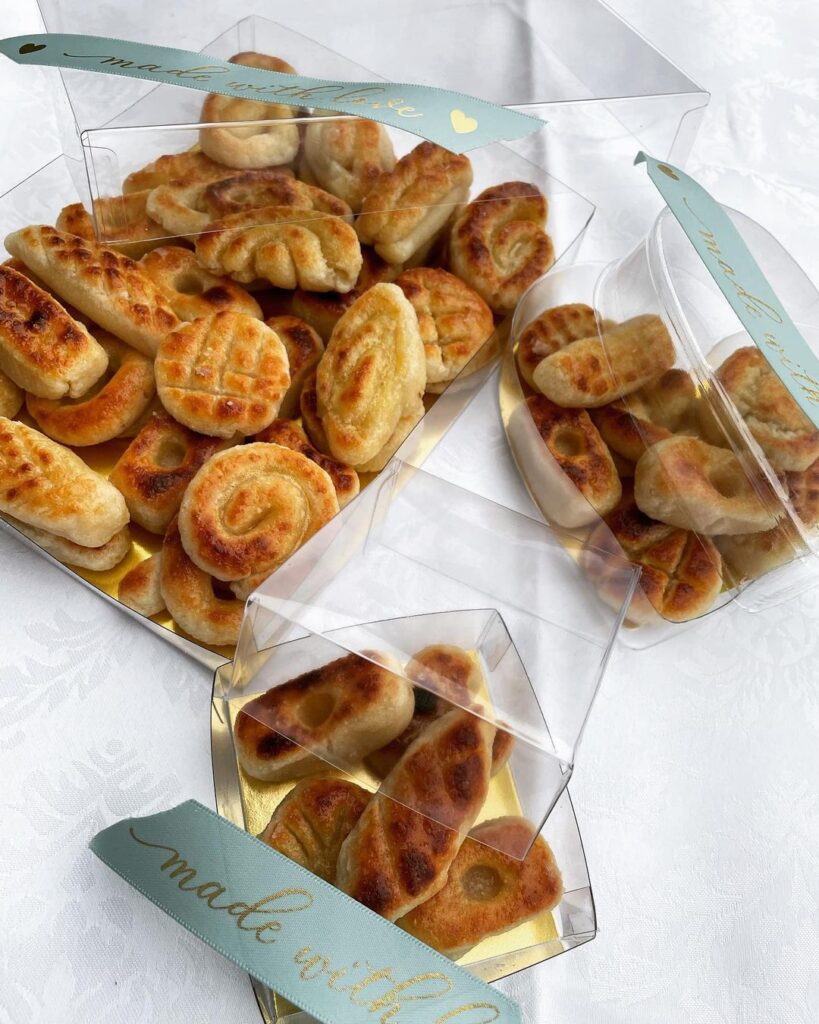
There are different thoughts about who invented Marzipan. While some people think that it originated in Spain, others think that Marzipan is an Italian candy. Therefore, the battle continues between Spain and Italy. The sources take us back to Arabic origins. It is described that a mixture of similar ingredients was used during Ramadan. Later on, after Muslims conquered Spain, the “seed was planted” and since then, Spain has been actively using and improving the sweet treat.
According to this version of the story, marzipan was invented in Toledo, where Muslims, Christians, and Jewish people lived together.
Soon, candy became very popular. It was even exported to different countries during the Spanish colonization. There are different varieties of marzipan today around the world. But the main difference between them is the kind of nuts used as an ingredient.
6 Most Popular Spanish Candy Loved by All
6. Mantecado
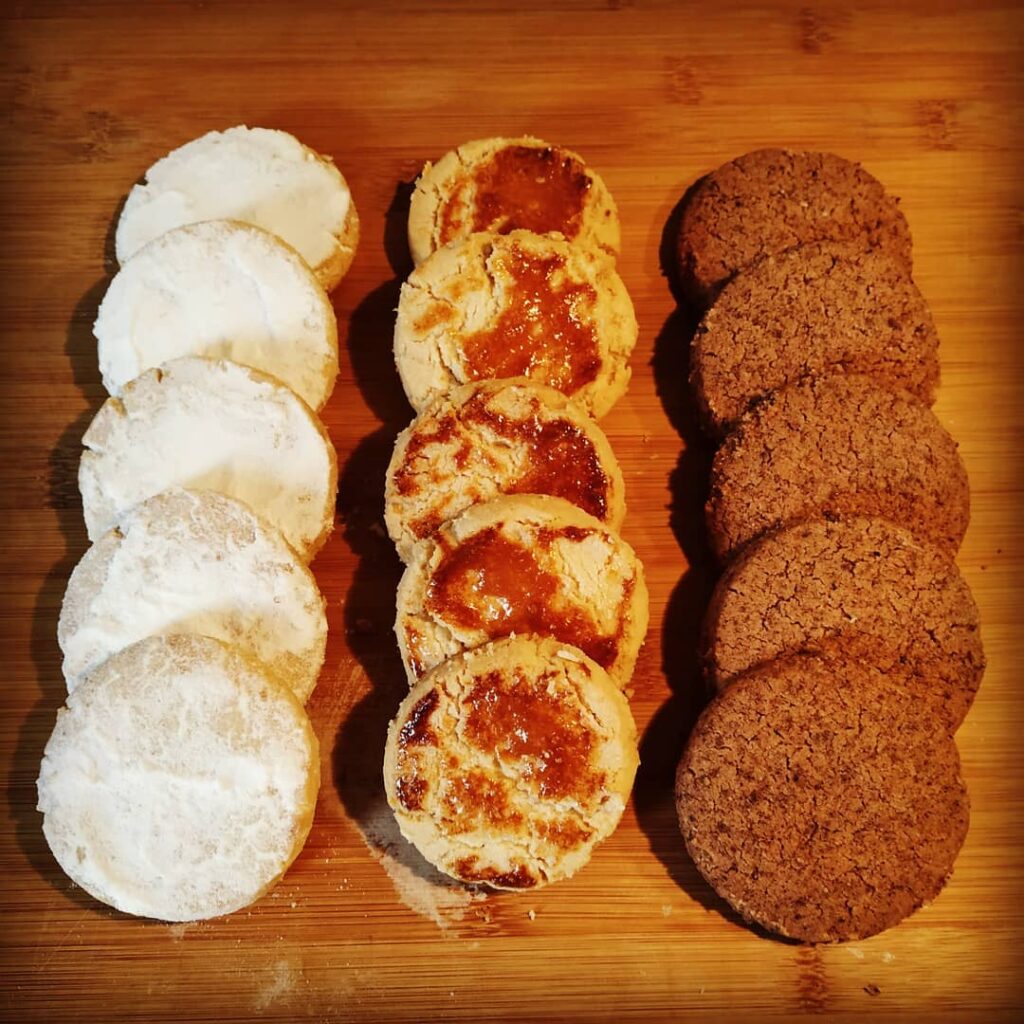
A Mantecado is a cookie that is especially popular as a traditional Christmas sweet in Spain. It is especially delicious and goes well with hot drinks. Cookies have a very soft and light texture.
The word “manteca” is lard or butter in Spanish. This Spanish candy has been made for centuries now. There are variations of mentacados and one of them is Polvorones. They have an anise flavor and a hint of lemon and cinnamon.
7. Chupa Chups
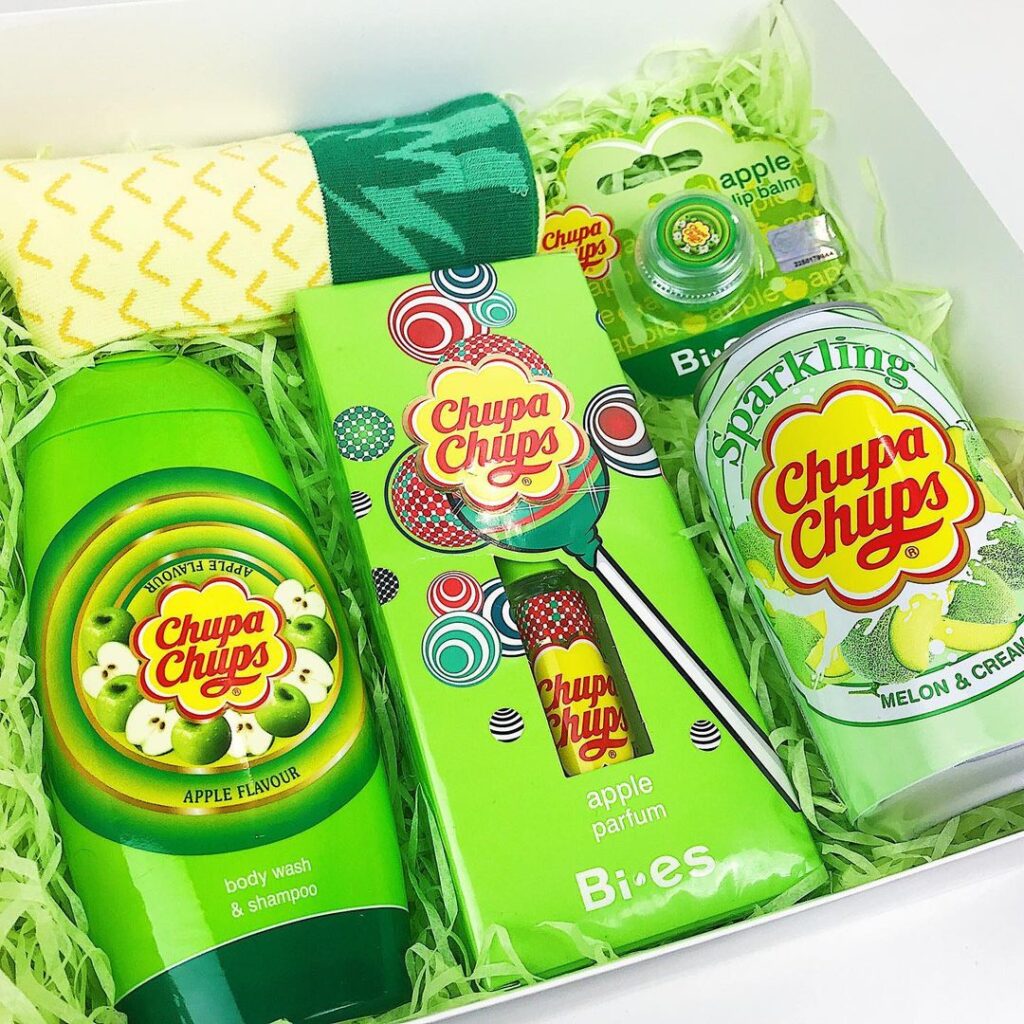
The one particular candy Spanish people are the proudest of is indeed Chupa Chups. Chupa Chups was actually one of the very first lollipops ever made. And soon enough, they were popular in the whole world. An interesting fact about this Spanish candy is that the design was actually created by Salvador Dali. The candy was produced in Barcelona, Spain, and sold in 150 countries.
The founder of Chupa Chups was Enric Bernat, and the brand was officially launched in 1958. Enric Bernat was working in an apple jam factory. He noticed that after melting sweets, his hands were getting sticky and sugary. From this, the idea of making Chupa Chups was born. At first, the candy stick was made out of wood, but later on, it was replaced by plastic. The product range and variations of Chupa Chups are huge.
8. Lacasitos
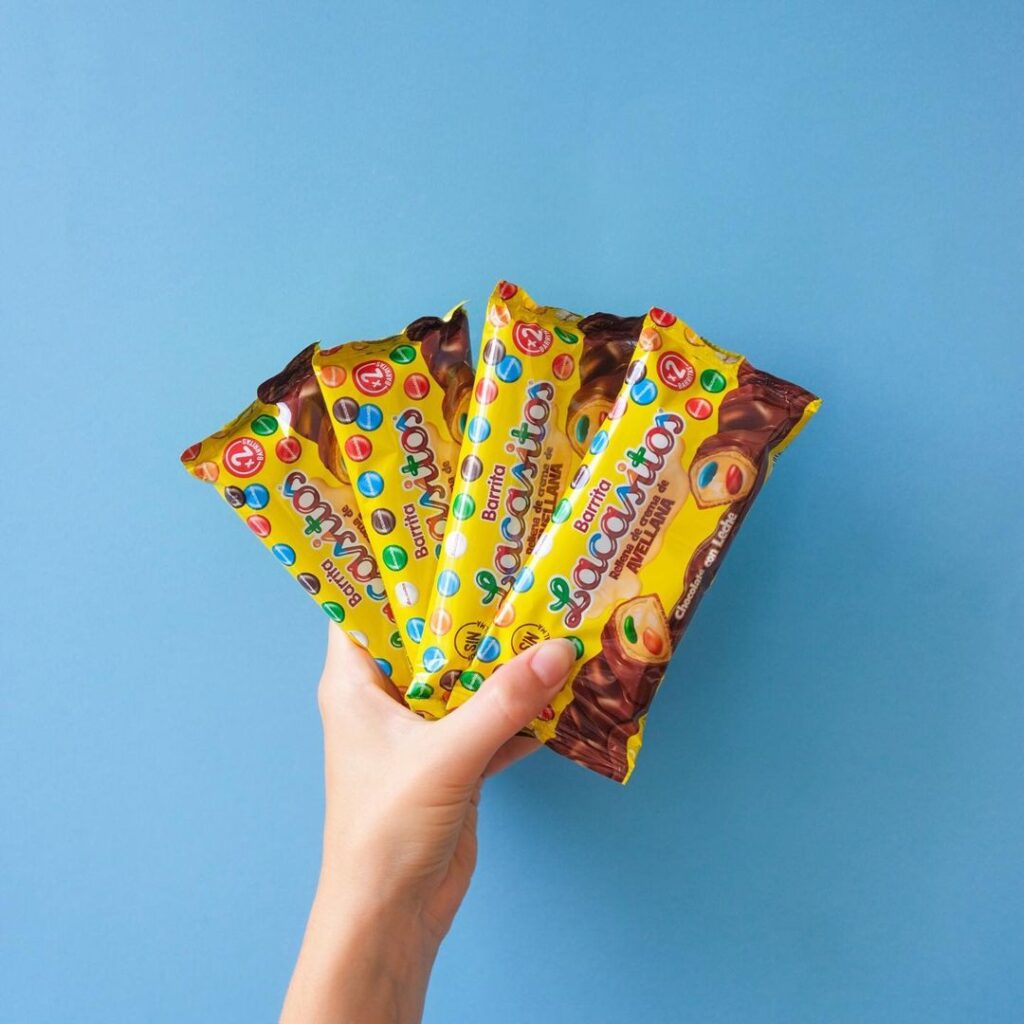
Lacasitos are widely regarded as one of the most popular and well-liked Spanish confections. This candy was first introduced in 1982. The producer was Lacasa S.A., a Zaragoza-based Spanish candy manufacturer.
Lacasitos look like M&M’s in shape. It is rounded and is small, bite-sized. The filling of the candy is chocolate and milk. The outside has a hard, crunchy layer. Lacasitos come in different colors, including white, yellow, orange, blue, red, and green. Chocolate candy consists of the following ingredients: cocoa, milk powder, butter, lactose, natural flavoring, and others.
9. Kinder Bueno
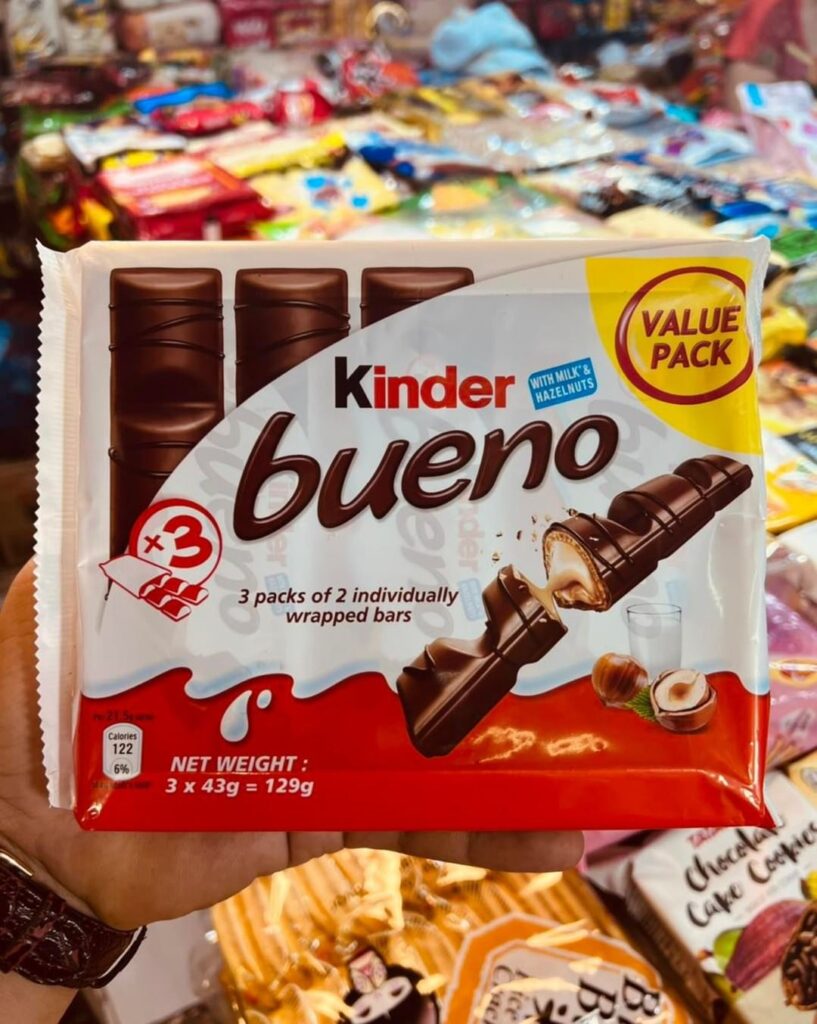
Kinder Bueno is definitely one of the most popular candies in Spanish among kids. However, actually, it’s not entirely Spanish candy. In fact, in 1978, the Italian company Ferrero which is one of the most popular candy brands worldwide introduced Kinder Bueno to the market. Hazelnut cream and chocolate are the primary ingredients in the Kinder Bueno. There are some other variations of candy too, like nougat and white chocolate.
“Kinder” is a German word meaning “child” and “bueno” is a Spanish word meaning “good”. There are 2 piece and 10 piece bar packages.
10. Pikotas
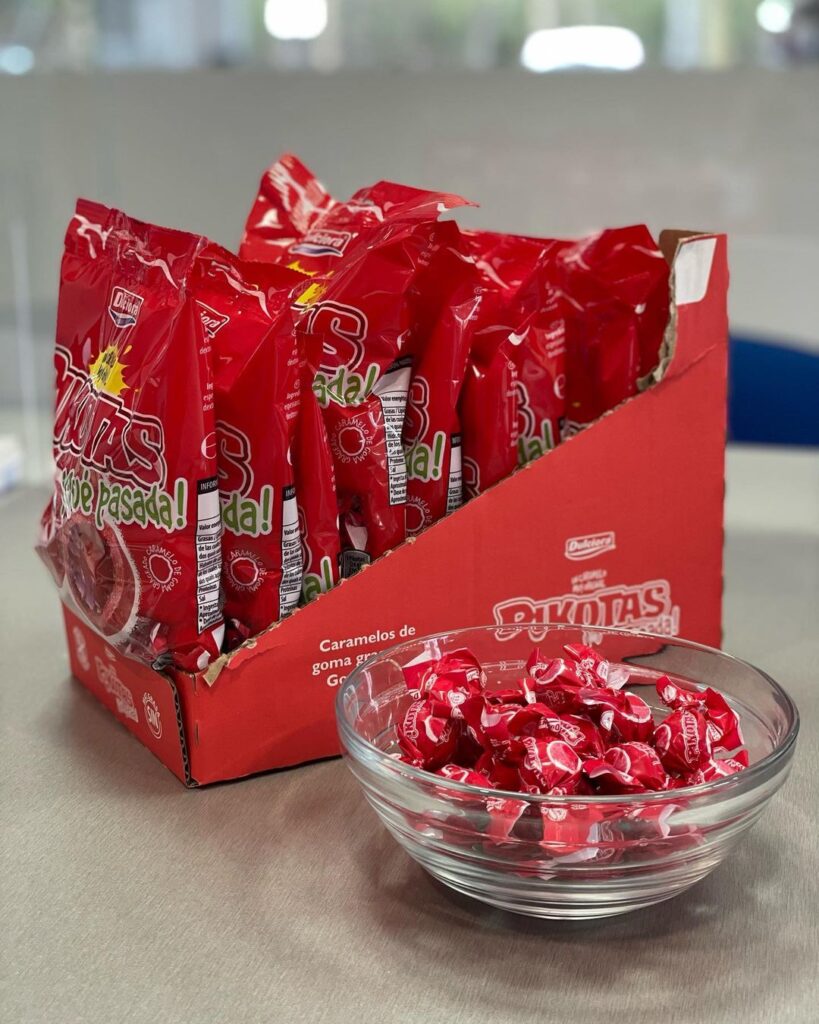
Pikotas are round, jelly candies manufactured by Dulciora. Candy has a sweet layer of sugar and a filling of soft jelly. The crunchiness of sugar and the texture of jelly together create a unique taste. This candy comes with a cherry flavor. The name of the candy is a Spanish word and means “cherry.” This sweet treat is gluten-free.
Candy is packaged in a pack that weighs 2 kilograms. There are 500 units of individually wrapped candy.
11. Fresquito
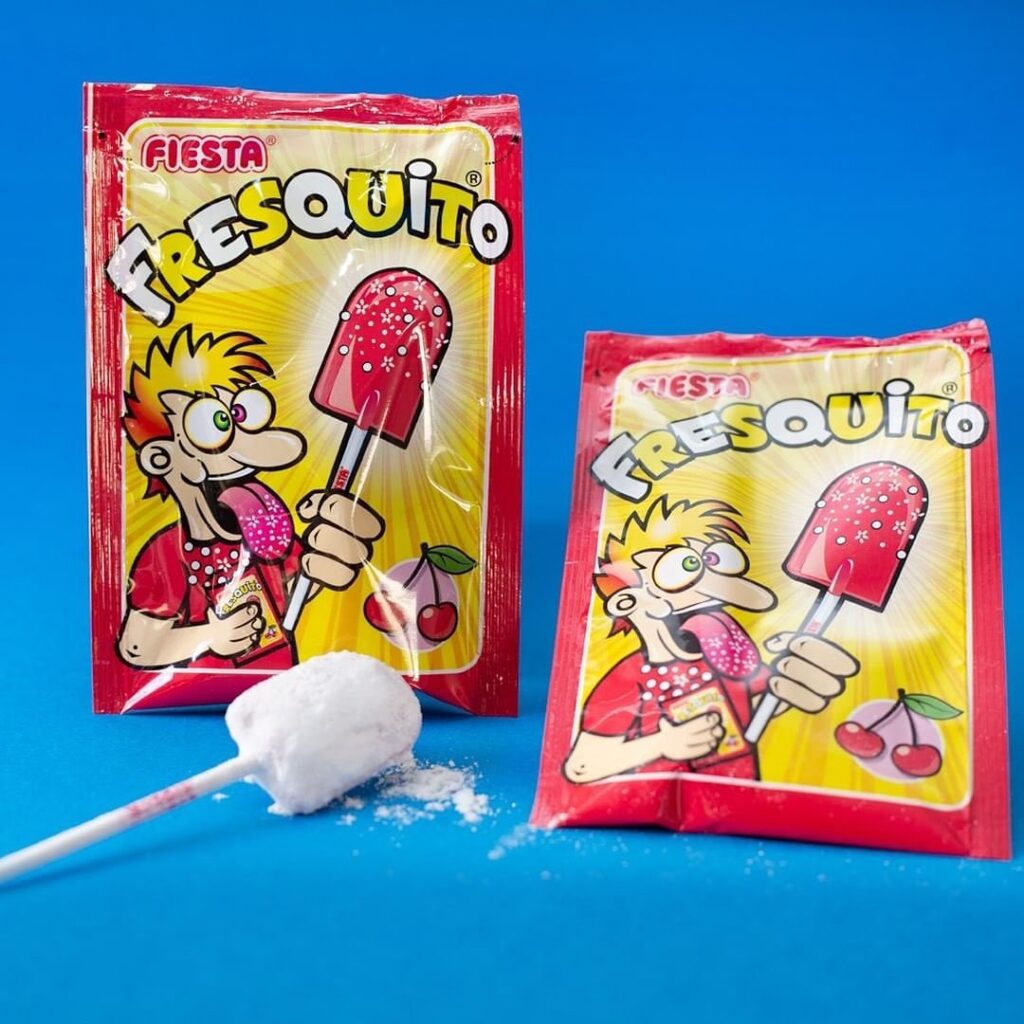
Fresquito is a lollipop manufactured under the brand Fiesta. Candy comes in various flavors, such as cherry, strawberry, coke, and others. With the lollipop, the package of sugar powder comes in the package. One is supposed to dip the lollipop in the powder. The packaging of the candy has a picture of an animated boy, who looks very excited and has the Fresquito lollipop in his hand.
Brief Confectionery History
Spanish candy history has been highly influenced by Arabic culture. After Muslims conquered Spain, many new products were introduced by them, which became a huge part of Spanish confectionery. Products such as rice, nuts, almonds, and honey have become actively used in making candies. Let’s now take a look at the origins of Spanish chocolate.
Chocolate
Generally, chocolate was invented by the Aztecs, located in Mexico. They got it from cocoa beans. After crushing them, they would mix them with water, ground chili, and fruit. Then, people started adding sugar, milk, and vanilla, which gave it a totally different taste. The original flavor of chocolate was bitter and spicy.
From Mexico, the secret recipe was brought and fell into the hands of Cistercian monks. They hid this recipe from Europeans, and it was only available to nobles for 100 years.
In the 17th century, chocolate was a very popular afternoon drink for royalties. In particular, women enjoyed the sweet drinks at the gatherings. It was fashionable and only available to the upper classes. Chocolate’s growing popularity resulted in an increase in international trade between South America and Europe. In the 19th century, techniques for processing cocoa became much easier and the product became more widespread. Finally, it also arrived in Spain and as a result, we got Spanish candy with chocolate.
Spanish Candy Brands
Simon Coll
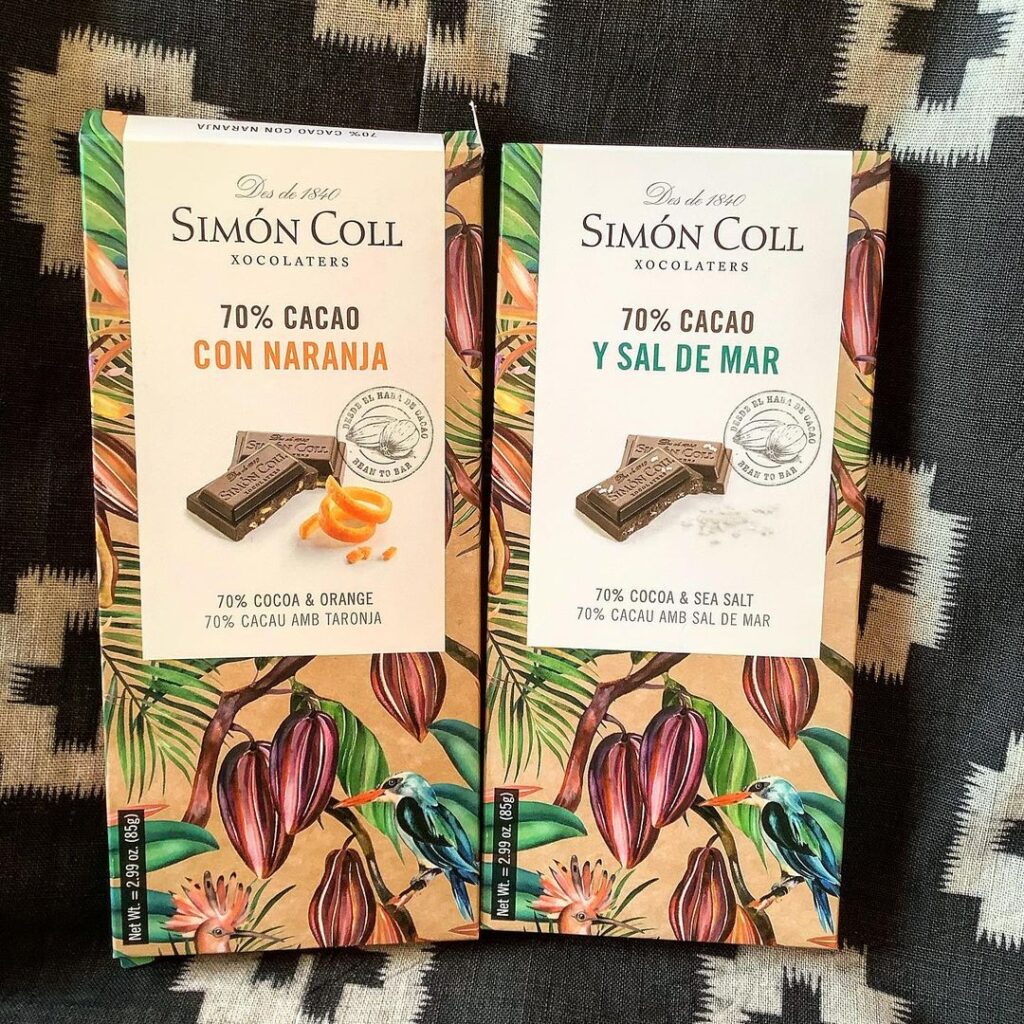
The Simon Coll candy brand is located in Barcelona and was founded in 1840 by Simon Mestres. Since then, the brand has been producing some of the highest quality chocolates. The brand has been on the market for more than 175 years. Since 1991, chocolate bars have been exported to major countries, and today they are present in the markets of 30 countries.
The Simon Coll chocolate line is made using traditional methods and recipes. It pretty soon became famous because of its taste and quality. There is a production of sweets in the form of tablets, seasonal chocolates, drinking chocolates, Art Nouveau-style chocolates, and others.
Chocolates Matias Lopez
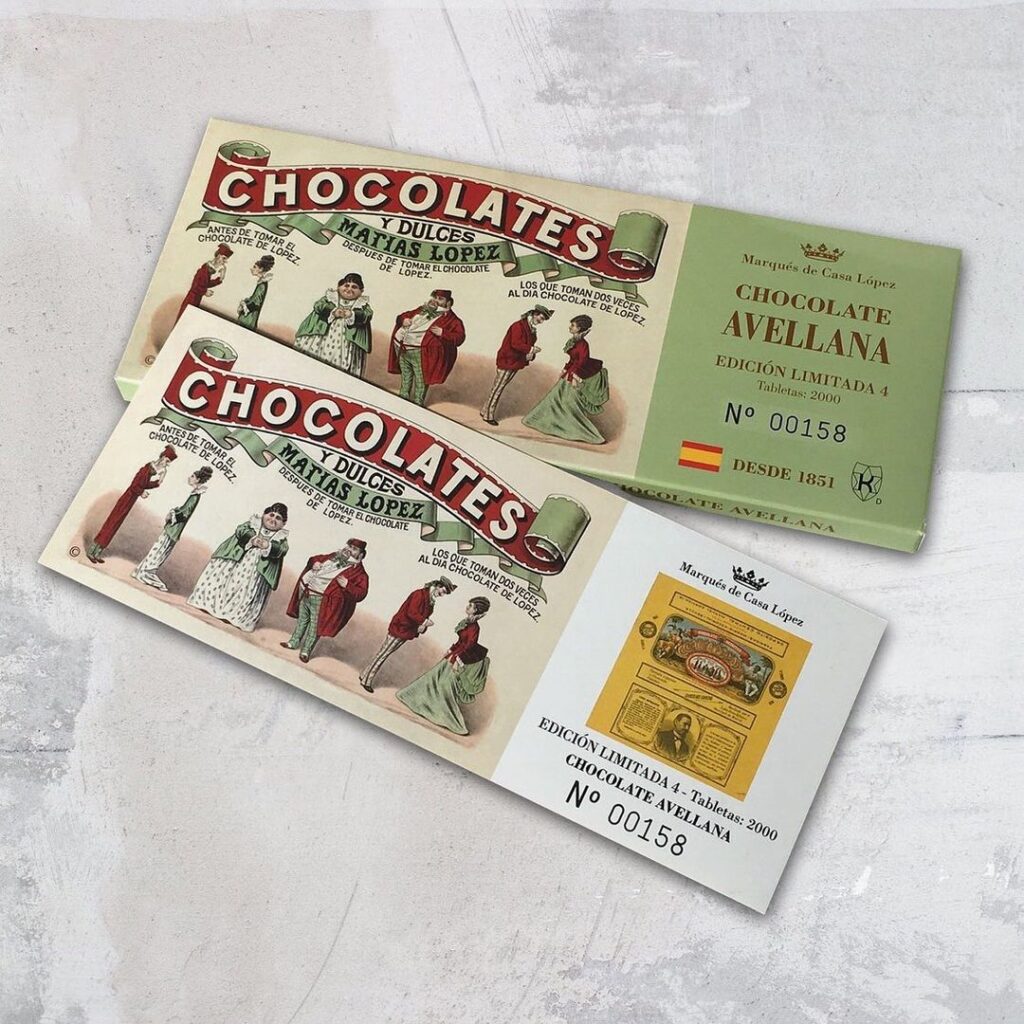
The famous Spanish candy brand was founded by a Galician manufacturer, Matias Lopez. He was one of the biggest chocolate producers and was the one who created the very first chocolate mill in 1852, located in Madrid.
In 1866, the production of chocolate by this brand was up to five tons a day. Actually, Matias Lopez was the very first chocolate producer who branded his chocolate and created vintage wrapping. Some of the unique chocolates offered by the brand are Chocolate Tostado, Con Leche, and Avellana.
Vidal Candies
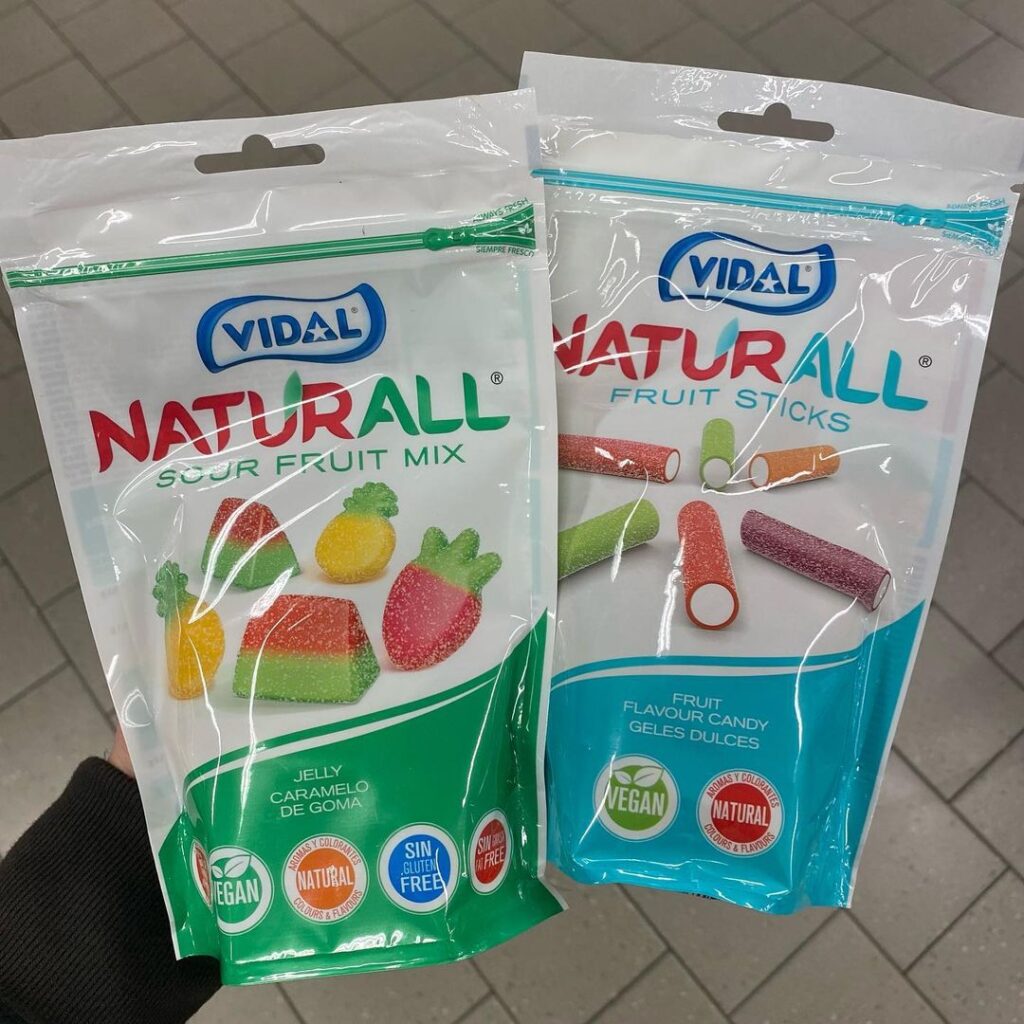
The Vidal Candy Company is another Spanish candy brand, founded in 1963. The headquarters are located in Molina de Sequa, Spain. Confectionery was founded by Francisco Hernandez Vidal.
The company is a large manufacturer of gummies. Brand products are associated with very strong and intense flavors. Vidal’s candy catalog has one of the widest choices of treats to offer, including jellies, hard candy, bubble gum, marshmallows, licorice, and others. Famous Vidal candies are Gummy Brains Candy, Vidal Gummy Santas, and Vidal Soft Fruit Wrap Candy.
The Vidal Candy Company pays a great deal of attention to its product quality. They are trying to achieve the highest quality standards. Brand is Kosher candy and Halal certifications.
Valor Chocolates
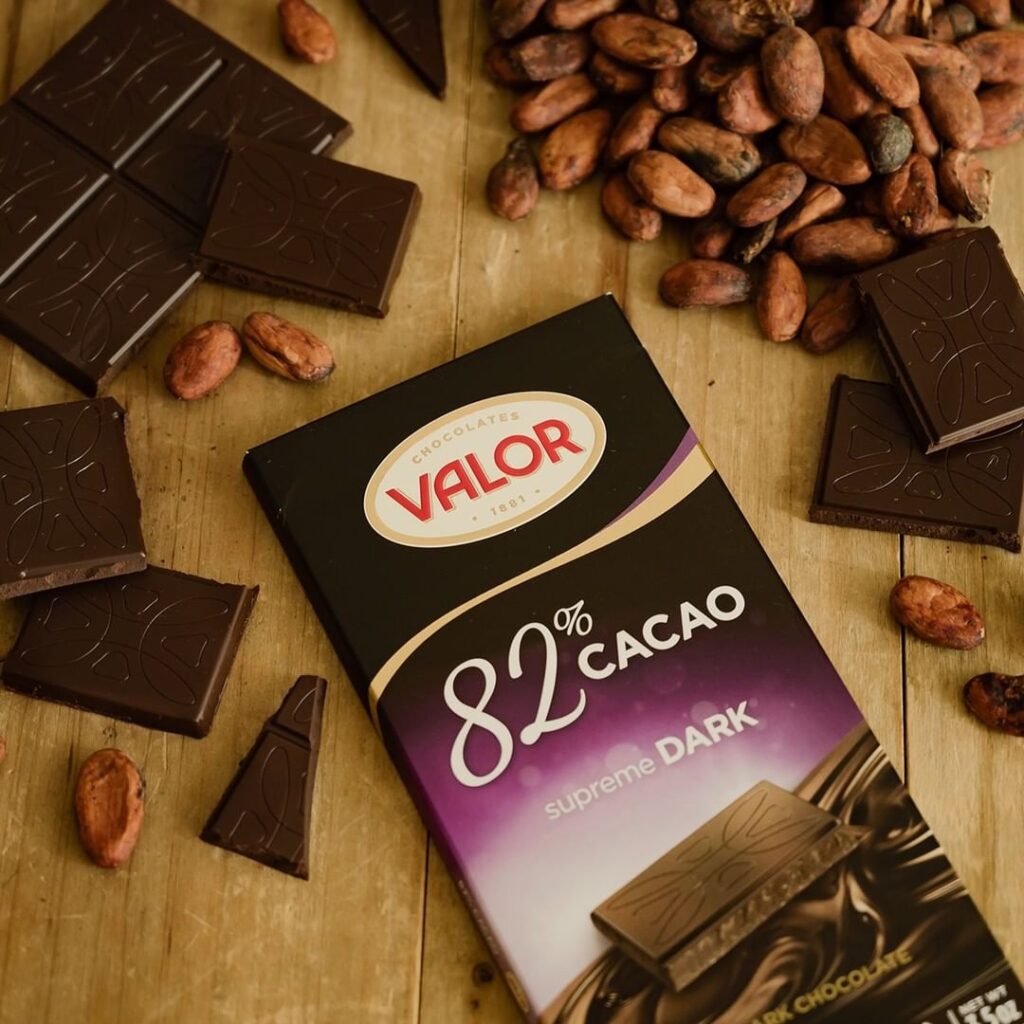
The Valor confectionery brand is one of the leading chocolate producers in Spain, Poland, Germany, Switzerland, and Belgium. The brand was founded by Valeriano Lopez Lloret in 1881.
In manufacturing, a high percentage of fine cocoa is used, which gives their brand image a much better and unique look. The brand also has chocolate cafes in Spain where they offer unique chocolate products. Valor Chocolate products are exported to 50 countries. Some of the delicious chocolates offered by the brand are Valor Dark Chocolate Bar, Valor Chocolate A LA Taza, Valor Special Chocolate Pure, UNREAL Dark Chocolate Coconut, and others.
Fini Candy Company
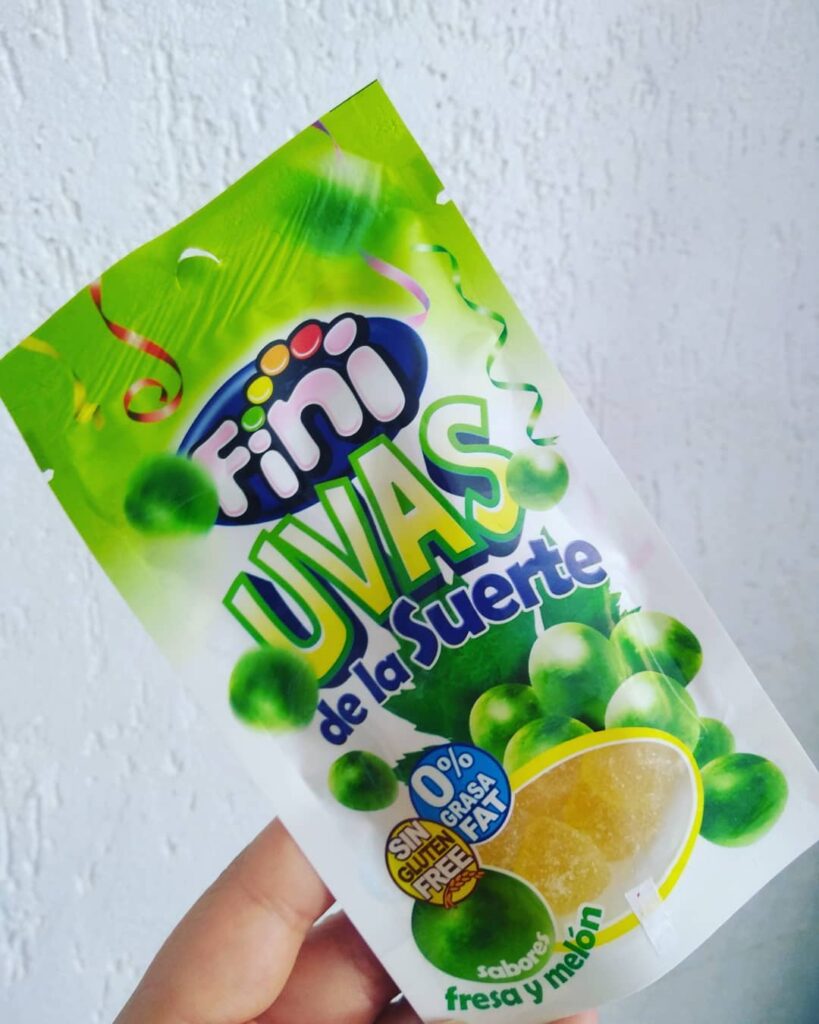
Fini is a Spanish confectionery brand, founded in the 1970s by Manuel Sanchez Cano. Since its appearance, the company has been growing, and the candy they produce quickly became one of the most popular candies from the 1970s.
Initially, they produced handcrafted gums in a 1000 square meter facility.
Currently, the company has multiple facilities spread over 125, 000 square meters. The brand has spread and has branches in Portugal, the UK, France, the USA, and Chile. Today it is one of Spain’s top candy and gummy manufacturers. Some of the sweet products from the brand are Clear Gummy Frogs, Giant Sour Tennis Gum Balls, Grape Nordic Gummy Fish, Gummy Octopus, etc.,
Bottom Line
There is one thing unifying all chocolate manufacturers from Spain, and that is an obsession for quality and a will for product development. Most of the famous candy brands are trying their best to maintain the highest quality standards. Actually, they are doing it pretty well because Spanish chocolate and candy are some of the most competitive on the market.
Spanish candy is somewhat special and unique. Confectionery heaven in Spain is created by a variety of styles, textures, and unique recipes. With the influence of Arabic culture and with the use of Aztec knowledge, sweet treats became a very significant part of the culture.
Which Spanish candy would you love to taste and why? Share your thoughts in the comment section.

Nato is a content writer and researcher with a background in psychology. She’s passionate about writing about the candy industry and exploring the cultural significance of sweets and treats. She believes that the stories behind our favorite snacks can reveal a great deal about our values.
Please leave a review or any memories of this snack in the comments below. Thank you!
Click here for a full A-Z list of Snacks and Candy
